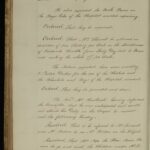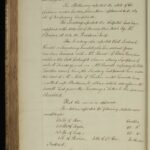Warning: Some of the historical language used in this article may be seen as offensive. Find out more about the historical language in our archive.
Our Stories of Interest volunteer, Matilda, tells the story of Foundling Frederick Handel, showing how the Foundling Hospital responded to children with mental disabilities.
Early Years
In her petition letter to the Foundling Hospital, Elizabeth Tooth wrote that she had delivered her baby while living on the street, without any existing ‘habitation’ or ‘settlement’. A woman named as Mrs Oxley supported her petition, stating that Elizabeth had previously been her servant and vouching for her character. Mrs Oxley had temporarily taken in Elizabeth and her baby, without which they both would have perished. But she was unable to continue her support. Without the intervention of the Foundling Hospital, her letter stresses, Elizabeth would potentially be driven to prostitution in order to provide for herself and her child.
Therefore, Elizabeth’s one-month-old baby was accepted into the Foundling Hospital on 5 July 1775, given the number 17021, and baptised with the name ‘Frederick Handel’. Foundlings were often given names that held significance to the Hospital. The famous baroque composer George Frideric Handel wrote the Hospital’s anthem in 1749 and conducted fund-raising concerts in the Hospital’s chapel. We can make an assumption that the Foundling Frederick Handel was referentially named in tribute.
Frederick was then fostered out, as was customary, to a wet nurse in the countryside. He was cared for by Mrs Mary Vallow of Crondall in Hampshire. After infancy, he returned to the Hospital, where we can see in the General Register that he was also inoculated for smallpox.
Later Life
It is at this point where the story of Frederick Handel in the Hospital’s archival records differentiates from the norm. Normally, around the early teenage years, Foundlings were apprenticed. Female children usually went into domestic service, and male children went into a trade or military service. Records were kept to note where each child was placed and in what year.
In a search of these apprenticeship records, Frederick does not appear. Where he does appear is in the Sub-committee minutes for 28 May 1801, when he would have been 25 years old. In these minutes, it is ordered that a Mrs Showell receive an extra shilling per week for her keeping of Frederick. Although the minutes for this meeting do not mention it, Mrs Showell can be connected to an establishment in Southwark, London, named Showell’s Poorhouse. Showell’s Poorhouse acted as a private workhouse where the Foundling Hospital sent, and paid for, those Foundlings unsuited to the traditional apprenticeship route, usually until they turned 21.
Foundlings could be unsuited for apprenticeships for a variety of reasons, including physical or mental disability. In a document filed in 1806 Mrs Showell states that Frederick’s violent behaviour was increasing, and we can guess that his reason for not being apprenticed was this.
As a result of his worsening behaviour, Mrs Showell refused to house Frederick any more. It is on record that the Hospital then sent him to Hoxton House mental asylum in East London, run by the Miles family. The minutes state that he would stay there until he could be admitted to Bedlam Hospital – perhaps the most famous mental asylum in British history. This did not happen, however.
- Sub-committee minutes: A/FH/A/03/005/024/186. Click to enlarge.
- Sub-committee minutes: A/FH/A/03/005/027/346. Click to enlarge.
As a neighbourhood, Hoxton saw an influx of asylums built during the late 18th century. It was thought that individuals with mental disabilities needed to be separated from the mainstream of society, for both parties’ safety. By the early 19th century, the area had become negatively associated with small-scale private mental asylums, such as Hoxton House, where private patients and paupers were cared for.
Between the year that Frederick entered Hoxton House (1806) and the year he is recorded to have died (1809), there is little to be found out about his life. There is potential to assume that he existed in poor conditions while there. In 1808, one year before his death, reports on the asylum stated a lack of adequate clothing made available to the patients eventually led to numerous committees looking into mistreatment at Hoxton House, and countrywide laws to protect vulnerable individuals in similar institutions (for example, the 1833 Madhouse Amendment Act).
Conclusion
The telling of the life stories of individuals, such as Frederick Handel, is crucial for several reasons. First, stories of children which differ from the normative life path encouraged by the Foundling Hospital deserve to have light shone on them. Second, stories like Frederick’s can illustrate how forms of mental disability or illness were understood and treated at the time, both inside the Foundling Hospital and in a wider socio-historical context.
Frederick’s life demonstrated the existence of a healthcare duality. In his childhood, the Hospital looked after his physical health by rescuing him from a life on the street, sending him to a wet nurse, and providing the tools of medical advancements (like the smallpox inoculation). In his adult life, however, Frederick’s mental instability made him unsuited to the Hospital’s process of apprenticeship. Although the Foundling Hospital continued to pay for Frederick’s care for the course of his life (long after he turned 21), the lack of medical and public understanding of mental illness and disability, and the lack of legal protection for vulnerable mentally ill and disabled individuals in Britain at the time, undoubtedly shaped Frederick’s life.
Bibliography
Petition letter: A/FH/A/08/001/001/006/061/a1-a2; A/FH/A/08/001/001/006/070/a1-a2; A/FH/A/08/001/001/006/073
Billet: A/FH/A/09/01/184/023
General Register: A/FH/A/09/002/004/432
Sub-committee minutes: A/FH/A/03/005/024/186; A/FH/A/03/005/027/346
Voices Through Time Transcription project: https://www.zooniverse.org/projects/jojo38/voices-through-time-the-story-of-care/collections/mobow/-showells-poorhouse
Science Museum: https://www.sciencemuseum.org.uk/objects-and-stories/medicine/victorian-mental-asylum
Lost Hospitals of London: https://ezitis.myzen.co.uk/hoxtonhouse.html
Copyright © Coram. Coram licenses the text of this article under Creative Commons Attribution-NonCommercial 4.0 (CC BY-NC).



